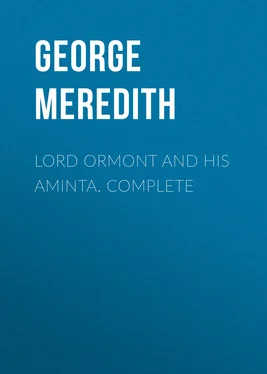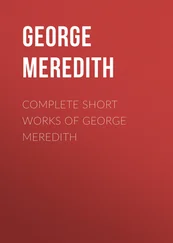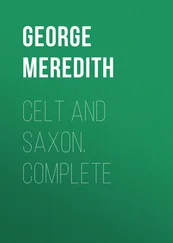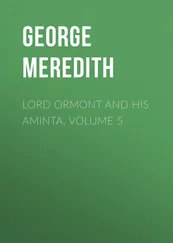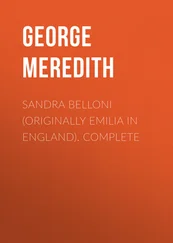George Meredith - Lord Ormont and His Aminta. Complete
Здесь есть возможность читать онлайн «George Meredith - Lord Ormont and His Aminta. Complete» — ознакомительный отрывок электронной книги совершенно бесплатно, а после прочтения отрывка купить полную версию. В некоторых случаях можно слушать аудио, скачать через торрент в формате fb2 и присутствует краткое содержание. Жанр: foreign_prose, literature_19, foreign_antique, на английском языке. Описание произведения, (предисловие) а так же отзывы посетителей доступны на портале библиотеки ЛибКат.
- Название:Lord Ormont and His Aminta. Complete
- Автор:
- Жанр:
- Год:неизвестен
- ISBN:нет данных
- Рейтинг книги:4 / 5. Голосов: 1
-
Избранное:Добавить в избранное
- Отзывы:
-
Ваша оценка:
- 80
- 1
- 2
- 3
- 4
- 5
Lord Ormont and His Aminta. Complete: краткое содержание, описание и аннотация
Предлагаем к чтению аннотацию, описание, краткое содержание или предисловие (зависит от того, что написал сам автор книги «Lord Ormont and His Aminta. Complete»). Если вы не нашли необходимую информацию о книге — напишите в комментариях, мы постараемся отыскать её.
Lord Ormont and His Aminta. Complete — читать онлайн ознакомительный отрывок
Ниже представлен текст книги, разбитый по страницам. Система сохранения места последней прочитанной страницы, позволяет с удобством читать онлайн бесплатно книгу «Lord Ormont and His Aminta. Complete», без необходимости каждый раз заново искать на чём Вы остановились. Поставьте закладку, и сможете в любой момент перейти на страницу, на которой закончили чтение.
Интервал:
Закладка:
“The gentleman—Mr. Weyburn: Mr. Arthur Abner’s recommendation,” he added hurriedly, with a light wave of his hand and a murmur, that might be the lady’s title; continuing: “A young man of military tastes should take service abroad. They’re in earnest about it over there. Here they play at it; and an army’s shipped to land without commissariat, ambulances, medical stores, and march against the odds, as usual—if it can march!
“Albuera, my lord?”
“Our men can spurt, for a flick o’ the whip. They’re expected to be constantly ready for doing prodigies—to repair the country’s omissions. All the country cares for is to hope Dick Turpin may get to York. Our men are good beasts; they give the best in ‘em, and drop. More’s the scandal to a country that has grand material and overtasks it. A blazing disaster ends the chapter!”
This was talk of an injured veteran. It did not deepen the hue of his ruddied skin. He spoke in the tone of matter of fact. Weyburn had been prepared for something of the sort by his friend, Arthur Abner. He noted the speaker’s heightened likeness under excitement to Lady Charlotte. Excitement came at an early call of their voices to both; and both had handsome, open features, bluntly cut, nothing of aquiline or the supercilious; eyes bluish-grey, in arched recesses, horny between the thick lids, lively to shoot their meaning when the trap-mouth was active; effectively expressing promptitute for combat, pleasure in attack, wrestle, tag, whatever pertained to strife; an absolute sense of their right.
As there was a third person present at this dissuasion of military topics, the silence of the lady drew Weyburn to consult her opinion in her look.
It was on him. Strange are the woman’s eyes which can unoffendingly assume the privilege to dwell on such a living object as a man without become gateways for his return look, and can seem in pursuit of thoughts while they enfold. They were large dark eyes, eyes of southern night. They sped no shot; they rolled forth an envelopment. A child among toys, caught to think of other toys, may gaze in that way. But these were a woman’s eyes.
He gave Lord Ormont his whole face, as an auditor should. He was interested besides, as he told a ruffled conscience. He fell upon the study of his old hero determinedly.
The pain of a memory waking under pillows, unable to do more than strain for breath, distracted his attention. There was a memory: that was all he knew. Or else he would have lashed himself for hanging on the beautiful eyes of a woman. To be seeing and hearing his old hero was wonder enough.
Recollections of Lady Charlotte’s plain hints regarding the lady present resolved to the gross retort, that her eyes were beautiful. And he knew them—there lay the strangeness. They were known beautiful eyes, in a foreign land of night and mist.
Lord Ormont was discoursing with racy eloquence of our hold on India: his views in which respect were those of Cuper’s boys. Weyburn ventured a dot-running description of the famous ride, and out flew an English soldier’s grievance. But was not the unjustly-treated great soldier well rewarded, whatever the snubs and the bitterness, with these large dark eyes in his house, for his own? Eyes like these are the beginning of a young man’s world; they nerve, inspire, arm him, colour his life; he would labour, fight, die for them. It seemed to Weyburn a blessedness even to behold them. So it had been with him at the early stage; and his heart went swifter, memory fetched a breath. Memory quivered eyelids, when the thought returned—of his having known eyes as lustrous. First lights of his world, they had more volume, warmth, mystery—were sweeter. Still, these in the room were sisters to them. They quickened throbs; they seemed a throb of the heart made visible.
That was their endowment of light and lustre simply, and the mystical curve of the lids. For so they could look only because the heart was disengaged from them. They were but heavenly orbs.
The lady’s elbow was on an arm of her chair, her forefinger at her left temple. Her mind was away, one might guess; she could hardly be interested in talk of soldiering and of foreign army systems, jealous English authorities and officials, games, field-sports. She had personal matters to think of.
Adieu until to-morrow to the homes she inhabited! The street was a banishment and a relief when Weyburn’s first interview with Lord Ormont was over.
He rejoiced to tell his previous anticipations that he had not been disappointed; and he bade hero-worshippers expect no gilded figure. We gather heroes as we go, if we are among the growing: our constancy is shown in the not discarding of our old ones. He held to his earlier hero, though he had seen him, and though he could fancy he saw round him.
Another, too, had been a hero-lover. How did that lady of night’s eyes come to fall into her subjection?
He put no question as to the name she bore; it hung in a black suspense—vividly at its blackest illuminated her possessor. A man is a hero to some effect who wins a woman like this; and, if his glory bespells her, so that she flings all to the winds for him, burns the world; if, for solely the desperate rapture of belonging to him, she consents of her free will to be one of the nameless and discoloured, he shines in a way to make the marrow of men thrill with a burning envy. For that must be the idolatrous devotion desired by them all.
Weyburn struck down upon his man’s nature—the bad in us, when beauty of woman is viewed; or say, the old original revolutionary, best kept untouched; for a touch or a meditative pause above him, fetches him up to roam the civilized world devouringly and lawlessly. It is the special peril of the young lover of life, that an inflammability to beauty in women is in a breath intense with him. He is, in truth, a thinly-sealed volcano of our imperishable ancient father; and has it in him to be the multitudinously-amorous of the mythologic Jove. Give him head, he can be civilization’s devil. Is she fair and under a shade?—then is she doubly fair. The shadow about her secretes mystery, just as the forest breeds romance: and mystery is a measureless realm. If we conceive it, we have a mysterious claim on her who is the heart of it.
He marched on that road to the music of sonorous brass for some drunken minutes.
The question came, What of the man who takes advantage of her self-sacrifice?
It soon righted him, and he did Lord Ormont justice, and argued the case against Lady Charlotte’s naked hints.
This dark-eyed heroine’s bearing was assured, beyond an air of dependency. Her deliberate short nod to him at his leave-taking, and the toneless few words she threw to my lord, signified sufficiently that she did not stand defying the world or dreading it.
She had by miracle the eyes which had once charmed him—could again—would always charm. She reminded him of Aminta Farrell’s very eyes under the couchant-dove brows—something of her mouth, the dimple running from a corner. She had, as Aminta had, the self-collected and self-cancelled look, a realm in a look, that was neither depth nor fervour, nor a bestowal, nor an allurement; nor was it an exposure, though there seemed no reserve. One would be near the meaning in declaring it to bewilder men with the riddle of openhandedness. We read it—all may read it—as we read inexplicable plain life; in which let us have a confiding mind, despite the blows at our heart, and some understanding will enter us.
He shut the door upon picture and speculations, returning to them by another door. The lady had not Aminta’s freshness: she might be taken for an elder sister of Aminta. But Weyburn wanted to have her position defined before he set her beside Aminta. He writhed under Lady Charlotte’s tolerating scorn of “the young woman.” It roused an uneasy sentiment of semi-hostility in the direction of my lord; and he had no personal complaint to make.
Читать дальшеИнтервал:
Закладка:
Похожие книги на «Lord Ormont and His Aminta. Complete»
Представляем Вашему вниманию похожие книги на «Lord Ormont and His Aminta. Complete» списком для выбора. Мы отобрали схожую по названию и смыслу литературу в надежде предоставить читателям больше вариантов отыскать новые, интересные, ещё непрочитанные произведения.
Обсуждение, отзывы о книге «Lord Ormont and His Aminta. Complete» и просто собственные мнения читателей. Оставьте ваши комментарии, напишите, что Вы думаете о произведении, его смысле или главных героях. Укажите что конкретно понравилось, а что нет, и почему Вы так считаете.
